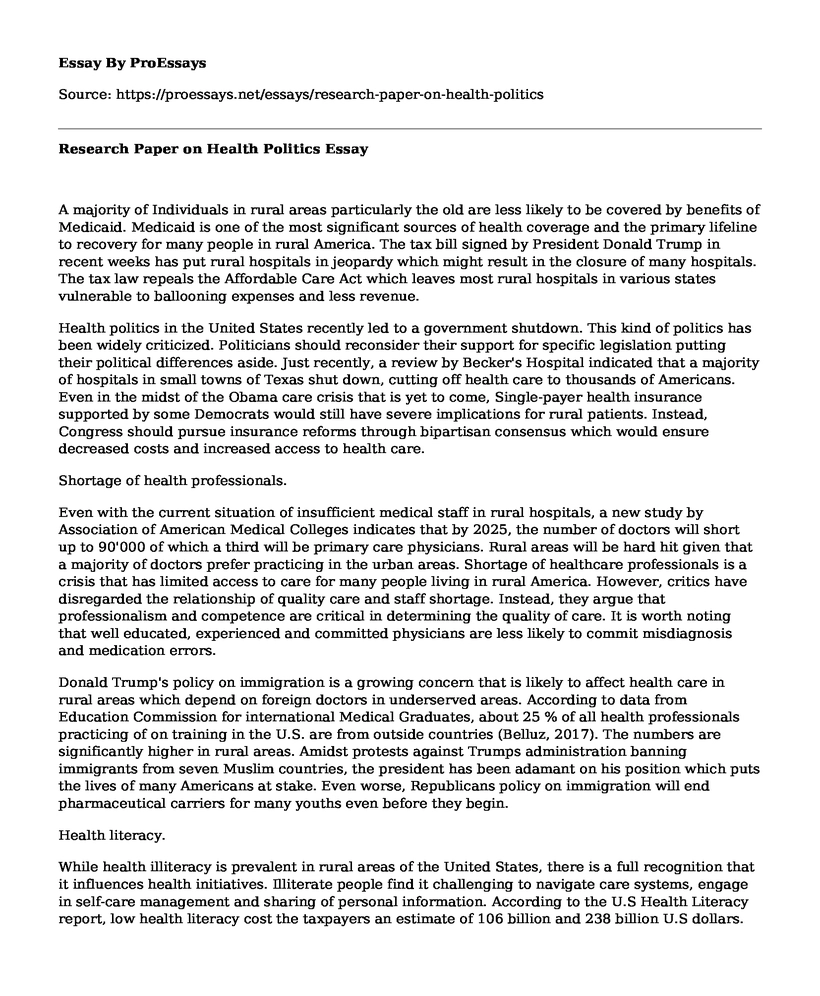A majority of Individuals in rural areas particularly the old are less likely to be covered by benefits of Medicaid. Medicaid is one of the most significant sources of health coverage and the primary lifeline to recovery for many people in rural America. The tax bill signed by President Donald Trump in recent weeks has put rural hospitals in jeopardy which might result in the closure of many hospitals. The tax law repeals the Affordable Care Act which leaves most rural hospitals in various states vulnerable to ballooning expenses and less revenue.
Health politics in the United States recently led to a government shutdown. This kind of politics has been widely criticized. Politicians should reconsider their support for specific legislation putting their political differences aside. Just recently, a review by Becker's Hospital indicated that a majority of hospitals in small towns of Texas shut down, cutting off health care to thousands of Americans. Even in the midst of the Obama care crisis that is yet to come, Single-payer health insurance supported by some Democrats would still have severe implications for rural patients. Instead, Congress should pursue insurance reforms through bipartisan consensus which would ensure decreased costs and increased access to health care.
Shortage of health professionals.
Even with the current situation of insufficient medical staff in rural hospitals, a new study by Association of American Medical Colleges indicates that by 2025, the number of doctors will short up to 90'000 of which a third will be primary care physicians. Rural areas will be hard hit given that a majority of doctors prefer practicing in the urban areas. Shortage of healthcare professionals is a crisis that has limited access to care for many people living in rural America. However, critics have disregarded the relationship of quality care and staff shortage. Instead, they argue that professionalism and competence are critical in determining the quality of care. It is worth noting that well educated, experienced and committed physicians are less likely to commit misdiagnosis and medication errors.
Donald Trump's policy on immigration is a growing concern that is likely to affect health care in rural areas which depend on foreign doctors in underserved areas. According to data from Education Commission for international Medical Graduates, about 25 % of all health professionals practicing of on training in the U.S. are from outside countries (Belluz, 2017). The numbers are significantly higher in rural areas. Amidst protests against Trumps administration banning immigrants from seven Muslim countries, the president has been adamant on his position which puts the lives of many Americans at stake. Even worse, Republicans policy on immigration will end pharmaceutical carriers for many youths even before they begin.
Health literacy.
While health illiteracy is prevalent in rural areas of the United States, there is a full recognition that it influences health initiatives. Illiterate people find it challenging to navigate care systems, engage in self-care management and sharing of personal information. According to the U.S Health Literacy report, low health literacy cost the taxpayers an estimate of 106 billion and 238 billion U.S dollars. This is equivalent to 7% and 17% respectively of all individual healthcare budgets. The National Action Plan to Improve Health Literacy established in 2010, is a policy that seeks to bring together all health stakeholders to improve health literacy in the United States. It is built on two core principles of, right to health information and care delivery that is beneficial and understandable.
America's rural population is vulnerable to inadequate health care. With the current trend in health policy, the future is oblique. However, policymakers and various stakeholders should arrive at decisions based on the needs of the citizens. Appropriate rural health policy is of the essence to rural Americans and practitioners in the medical field. The American Medical Association has been on the forefront supporting physicians in making decisions regarding their location of practice, with the hope of reducing shortage of healthcare staff in underserved regions like the rural areas (Heath, 2017).
References
Heath, S. (2017). Strategies for Rural Patient Healthcare Access Challenges. Patient EngagementHIT, 24.
Julia Belluz, S. F. (2017). How Trumps immigration ban threatens health care, in 3 charts. Vox, https://www.vox.com/2017/2/1/14470746/trumps-immigration-ban-healthcare-doctors.
Phillips, D. (2017). Rural Americans at Higher Risk for Five Leading Causes of Death. Medscape, 12-18.
Cite this page
Research Paper on Health Politics. (2021, Sep 01). Retrieved from https://proessays.net/essays/research-paper-on-health-politics
If you are the original author of this essay and no longer wish to have it published on the ProEssays website, please click below to request its removal:
- Sociology Essay on the Immigration Problem in the United States
- Brain Disease and Football - Research Paper Example
- Perception of the Internet as a Tool for Finding Health Information Paper Example
- Discrimination Against People With HIV/AIDS Essay Example
- Essay Sample on Cigarette Companies: Persuasive Ads, Quadrupled Spending
- Essay Example on Ethical & Legal Implications in Nursing Practice
- France's Political and Criminal Justice Developments Since 2013 - Essay Sample







